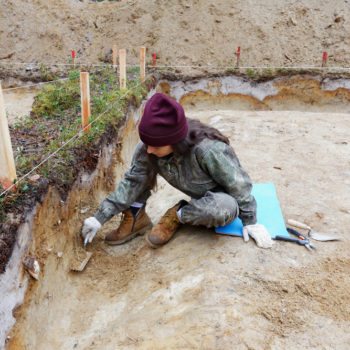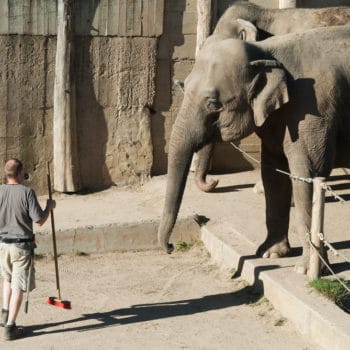Why We Love It
-
$105,720Potential Avg. Salary
-
10.4%Job Growth Rate
-
Growing DemandJob Outlook
-
Good Entry Level SalaryCareer Attribute
Paleontology deals with the fossils of plants and animals. It is a science of interdisciplinary fields that primarily incorporates biology and geology, along with anthropology, chemistry and archeology.
Recommended Schools
What is a Paleontologist?
Paleontologists must be accomplished analysts, detail-oriented individuals with a strong aptitude for the natural sciences. They are logical thinkers capable of organizing the various facets of their work into cohesive arguments presented to their peers, employers and the public. Compensation is above average in comparison to the median for all occupations and job satisfaction is consistently rated highly. Paleontologists are strong in academics and are emotionally stable, as this is required to complete the years of schooling that are necessary to work in this field.
In the course of their work, paleontologists typically do the following:
- Analyze data, including rock samples, aerial photographs and records of previous geologic formations uncovered in order to locate new, untapped natural resources and approximate their size and contents
- Carry out studies in the field, collecting samples, photographs and conducting surveys
- Laboratory testing of samples collected in the field
- Research and create geologic charts and maps
- Analyze available data to determine potential locations of fossils; excavate layers of rock to locate fossils; determine age and origin and time period
Paleontologists are concerned in the larger sense with studying fossils and geological formations to study and trace the evolution of all life on Earth. The practical application of such lofty scientific goals takes many forms, from computer programs, electron microscopes and remote sensing equipment to hand tools such as brushed, chisels and picks. It is as likely to spend the working day inside an office analyzing data as it is excavating a job site. Paleontologists must therefore be comfortable wearing different ‘hats’ as well as working in isolation or in teams.
AREAS OF SPECIALIZATION
There are numerous areas of study within the broader umbrella of paleontology that can be a particular focus in a career, depending on particular interests. These include vertebrate and invertebrate paleontogloy, paleobotany, taphonomy, micropaleontology and biostratigraphy.
TYPICAL EMPLOYERS
Research and instruction in a college or university setting is the primary destinations for those interested in pursuing a career in paleontology. However, there are a few notable destinations outside of teaching in a university, such as consulting, museums, government at all levels and mining companies
JOB GROWTH
Paleontology is a growing profession. It is projected to increase slightly faster than the national average for all occupations over the next ten years, spurred on by new technologies like hydraulic fracturing and a need for environmental protection and conservation balanced against inevitable energy demands.
Recommended Schools
How To Become a Paleontologist
A doctorate in paleontology is usually required in order to enter the field, and an absolute necessity for a career in academia. Generally, a comprehensive background in geology and biology is necessitated and coursework at the undergraduate level will additionally focus intensively on mathematics, the natural science and statistics.
A small percentage of colleges will offer paleontology as a concentration within a larger field of study, such as biology, geology or anthropology. Upon entering graduate school, students will choose a specific path, such as paleoecology, palynology and vertebrate or invertebrate paleontology. Beyond academic coursework, publishing, laboratory time and field experience are crucial for advancement.
Paleontologist Salary Data
We’ve provided you the following to learn more about this career. The salary and growth data on this page comes from recently published Bureau of Labor Statistics data while the recommendations and editorial content are based on our research.
National Anual Salary
Low Range
$62,030Average
$105,720High Range
---National Hourly Wage
Low Range
$30/hrAverage
$51/hrHigh Range
---How do Paleontologist salaries stack up to other jobs across the country? Based on the latest jobs data nationwide, Paleontologist's can make an average annual salary of $105,720, or $51 per hour. On the lower end, they can make $62,030 or $30 per hour, perhaps when just starting out or based on the state you live in.
Salary Rankings And Facts
#55 Nationally for All Careers
Above Average Salary Nationally
Programs and Degrees
Here are the most common degrees for becoming a Paleontologist. a is usually recommended and specifically a degree or coursework that prepares you for the particular field, see below.
Highest Education Among Paleontologists
- 9.4% Doctorate
- 36.8% Masters
- 47.1% Bachelors
- 2.3% Associates
- 4.1% College
- 0% High School
- 0.3% Less than High School
Job Growth Projections and Forecast
2014 Total Jobs
36,4002024 Est. Jobs
40,200Job Growth Rate
10.4%Est. New Jobs
3,800How does Paleontologist job growth stack up to other jobs across the country? By 2024, there will be a change of 3,800 jobs for a total of 40,200 people employed in the career nationwide. This is a 10.4% change in growth over the next ten years, giving the career a growth rate nationwide of Above Average.
Growth Rankings And Facts
#176 Nationally for All Careers
Above Avg. Growth Nationally
What Companies Employ The Most Paleontologists
| Industry | Current Jobs | New Jobs Needed | % Increase |
|---|---|---|---|
| Oil and gas extraction | 8,000 | 1,000 | 1% |
| Engineering services | 6,200 | 800 | 1% |
| Management, scientific, and technical consulting services | 5,300 | 1,500 | 2% |
















